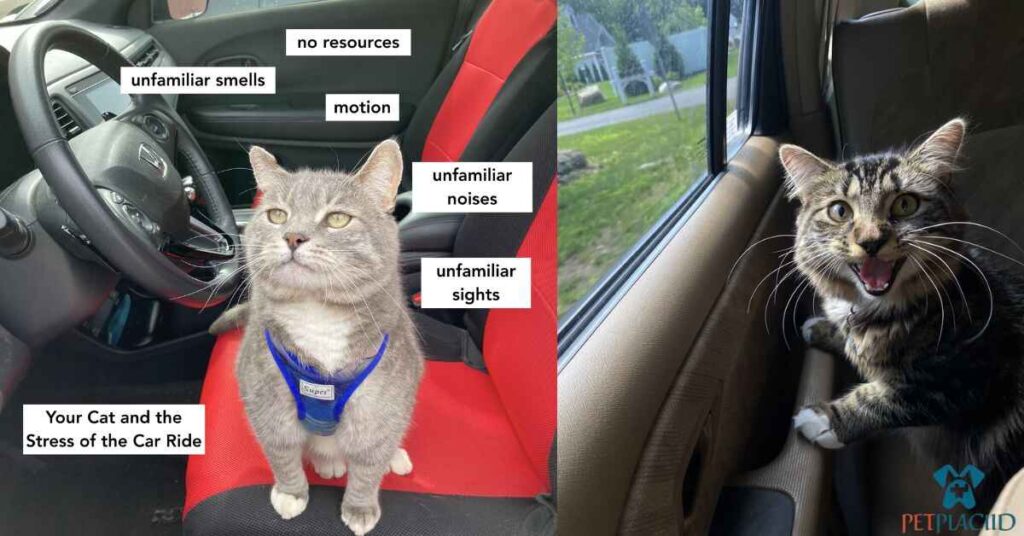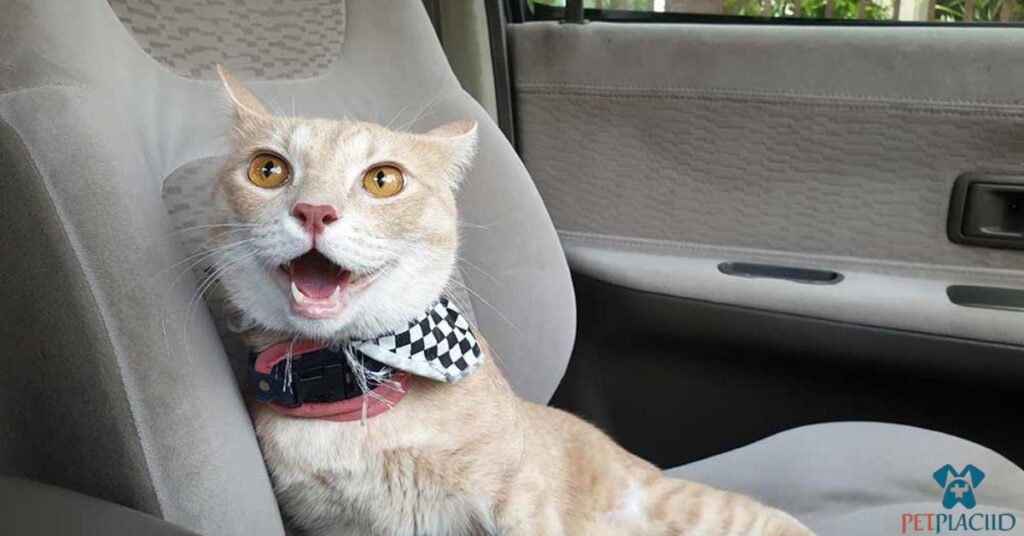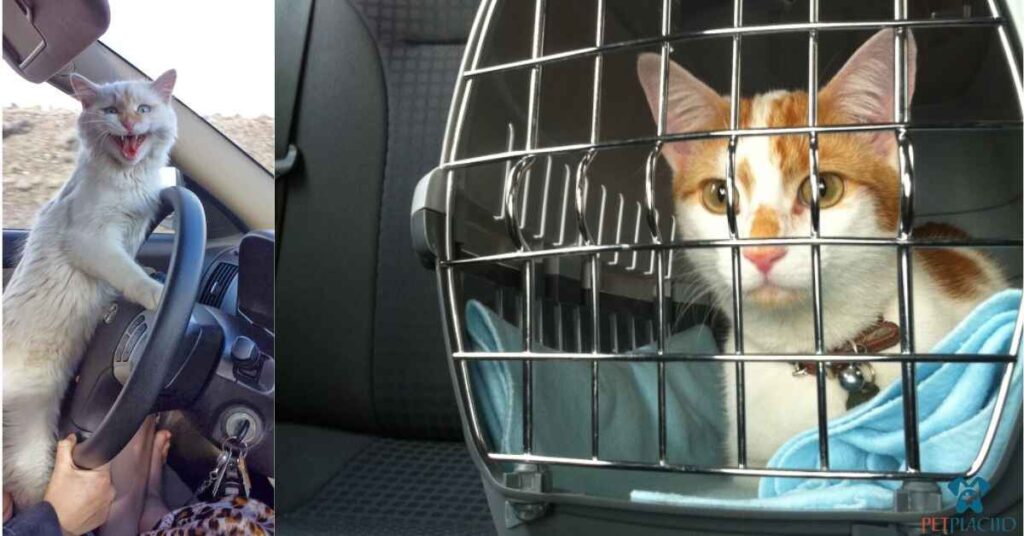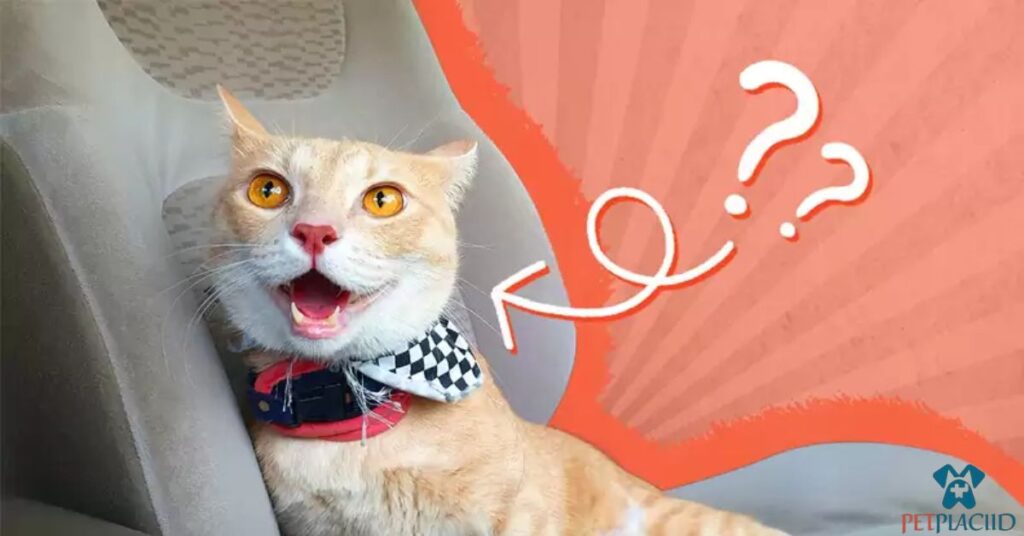Has your furry feline friend ever started panting heavily during a car ride, leaving you puzzled and concerned? Don’t worry; you’re not alone. Many cat owners have experienced this unsettling behavior, but understanding the reasons behind it can help you address the issue effectively. Unlike dogs, who pant to cool down, panting in cats is an uncommon behavior that signals distress.
In this article, we’ll explore the common causes of cat panting in cars and provide practical tips to help your feline companion stay calm and comfortable during those dreaded car journeys. By recognizing the potential underlying issues and taking proactive measures, you can ensure your cat’s well-being and make car travel a less stressful experience for both of you.
Understanding Cat Panting: Why It’s a Cause for Concern
Cats are known for their graceful and composed demeanor, which is why seeing them pant can be alarming. Unlike dogs, cats don’t pant rapidly as a normal cooling mechanism. Instead, panting in cats is often a sign that something isn’t right, and it’s crucial to address it promptly.
Potential underlying causes of panting in cats can range from stress and anxiety to more serious respiratory issues or heart problems. Ignoring this behavior could lead to further complications, as it might indicate that your feline friend is not getting enough oxygen or is experiencing respiratory distress.
Some degree of panting can be seen in cats after strenuous exercise or exposure to high temperatures, but if the panting is persistent or accompanied by other concerning symptoms, it’s essential to seek veterinary attention.
The Anxiety Factor: Why Car Rides Can Stress Out Your Cat

Cats are territorial animals, and unfamiliar environments can trigger anxiety and stress, leading to panting. The confined space of a car, combined with strange sights and sounds, can be overwhelming for our feline friends. This anxiety can release stress hormones, causing an increased heart rate and, consequently, panting.
Signs of Car Anxiety in Cats
- Excessive meowing/vocalization
- Restlessness/pacing
- Drooling
- Vomiting/diarrhea
- Hiding/cowering
If you notice any of these signs along with panting during a car ride, it’s likely that your cat is experiencing significant travel anxiety. Addressing this anxiety is crucial to prevent further distress and potential health complications.
Why is My Cat Panting in the Car? (5 Possible Reasons)
1. Nausea

Nausea can be another contributing factor to panting in cats during car rides. The motion of the vehicle, along with the unfamiliar sights, sounds, and smells, can trigger feelings of nausea or motion sickness in some felines. This discomfort can lead to increased anxiety and stress, which may manifest as panting.
Key points about nausea and panting in cats:
- Motion sickness can cause nausea, leading to panting as a stress response.
- Symptoms of nausea in cats may include drooling, lip-licking, and swallowing excessively.
- Cats with a history of car sickness may be more prone to nausea-induced panting.
- Providing a familiar scent, such as a blanket or toy, can help calm nausea during travel.
- In severe cases, your veterinarian may recommend anti-nausea medication for car rides.
2. The Heat
Overheating is a significant concern for cats during car rides, especially in warm weather or if the vehicle lacks proper ventilation. As mentioned earlier, cats don’t sweat like humans, and panting is their primary means of regulating body temperature. Prolonged exposure to high temperatures can quickly lead to overheating and respiratory distress, prompting panting as a cooling mechanism.
Key points about heat and panting in cats:
- Ensure the car is well-ventilated or has air conditioning to maintain a comfortable temperature.
- Offer water breaks during long journeys to prevent dehydration, which can exacerbate overheating.
- Avoid leaving your cat unattended in a parked car, as temperatures can rise rapidly, leading to heatstroke.
- Signs of overheating include excessive panting, bright red tongue, lethargy, and rapid breathing.
- If your cat shows signs of overheating, seek veterinary attention immediately, as it can be life-threatening.
3. Fear
Fear and anxiety can be significant contributing factors to panting in cats during car rides. Cats are creatures of habit and can become easily stressed by unfamiliar environments and situations. The confines of a car, coupled with the motion and strange noises, can trigger a fear response in some felines.
Key points about fear and panting in cats:
- Cats may associate car rides with negative experiences, such as visits to the veterinarian.
- Gradual desensitization to the car and carrier can help reduce fear and anxiety.
- Using pheromone products, like sprays or diffusers, can create a calming environment.
- Covering the carrier with a familiar-smelling blanket can provide a sense of security.
- In severe cases of fear-induced panting, your veterinarian may recommend anti-anxiety medication.
4. Stress

Stress is often a common denominator in many cases of panting in cats during car rides. Even if your feline friend doesn’t exhibit overt signs of fear or anxiety, the unfamiliar environment and situation can still trigger a stress response. This stress can manifest as panting, restlessness, or other concerning behaviors.
Key points about stress and panting in cats:
- Stress can be caused by various factors, including unfamiliar environments, loud noises, and confinement.
- Chronic stress can have negative impacts on your cat’s overall health and well-being.
- Providing a secure, comfortable carrier and offering treats or toys can help reduce stress during travel.
- Gradual exposure to the car and carrier can help desensitize your cat and reduce stress levels.
- In severe cases of stress-induced panting, your veterinarian may recommend stress-reducing medications or supplements.
5. Underlying Medical Problems
While panting in cats during car rides is often attributed to stress, anxiety, or environmental factors, it’s essential to consider the possibility of underlying medical problems. Certain respiratory conditions, heart diseases, or other illnesses can cause labored breathing or panting, even in seemingly calm situations.
Key points about underlying medical problems and panting in cats:
- Respiratory issues, such as asthma, bronchitis, or lung disease, can make breathing more difficult and lead to panting.
- Heart conditions, like cardiomyopathy or congestive heart failure, can cause respiratory distress and panting.
- Anemia or other blood disorders that affect oxygen delivery can also contribute to panting.
- If your cat exhibits persistent panting, even when not in the car, it’s crucial to consult your veterinarian for a thorough examination.
- Diagnostic tests, such as blood work, x-rays, or ultrasounds, may be necessary to identify any underlying medical conditions.
It’s important to note that while panting in cats during car rides is often attributed to stress or environmental factors, persistent or severe panting should always be evaluated by a veterinarian to rule out any underlying medical conditions.
Tips to Keep Your Cat Calm and Cool in the Car
To minimize stress and discomfort for your feline friend during car rides, consider implementing the following tips:
Prepare Your Cat for Car Rides
- Get them used to the carrier: Introduce the carrier well in advance and make it a positive space by placing treats, toys, and familiar bedding inside.
- Use pheromone sprays/diffusers: Synthetic pheromones can help reduce anxiety and promote a sense of calm in cats.
- Provide a familiar blanket/toy: Bringing along a familiar scent can help your cat feel more at ease.
- Consider anti-anxiety medication: In severe cases of travel anxiety, your veterinarian may recommend anti-anxiety medication.
During the Ride
- Keep the car cool: Use air conditioning to maintain a comfortable temperature and avoid overheating.
- Offer water breaks: Without forcing, provide small amounts of water during longer journeys to prevent dehydration.
- Play calming music: Soft, relaxing music can help soothe your cat and drown out unsettling noises.
- Use a pheromone-infused spray/wipe for the carrier: These products can help create a calming environment within the carrier.
- Take breaks on long journeys: Stop periodically to allow your cat to stretch, use the litter box, and rehydrate.
Post-Ride Care
- Check for signs of overheating/dehydration: Monitor your cat’s breathing, gum color, and overall demeanor after the ride.
- Offer water and a litter box: Ensure your cat has access to fresh water and a clean litter box upon arrival.
- Allow time to decompress and destress: Provide a quiet, familiar space for your cat to rest and readjust after the stressful journey.
Conclusion
Car rides may never be your cat’s favorite activity, but with patience, preparation, and the right strategies, you can minimize stress and keep your feline friend safe and comfortable during those necessary journeys. By understanding the potential causes of panting, such as anxiety, overheating, or underlying medical conditions, you can take proactive steps to address the issue.
Remember, if panting persists or worsens, or if you notice any other concerning symptoms, it’s crucial to consult your veterinarian promptly. They can perform diagnostic tests, such as blood evaluation, imaging (x-rays and ultrasound), to rule out any underlying medical conditions and provide appropriate treatment or preventive measures.
With the right approach, you can turn those dreaded car rides into more manageable experiences for both you and your beloved feline companion.
FAQs
Why is my cat panting while playing?
Your cat might pant while playing if she’s exerting herself too much or is overly excited. This can happen when a cat gets very active and needs to catch her breath, but it should stop after a short rest.
Why is my cat panting after being outside?
Your cat may pant after being outside if she’s been exposed to high temperatures or has been very active. Panting can be a way for her to cool down or recover from physical exertion, especially on hot days.
Why is my cat breathing with her mouth open in the car?
Your cat might be breathing with her mouth open in the car due to stress or anxiety, as traveling can be unsettling for cats. It could also indicate difficulty breathing or overheating, so it’s important to monitor her closely.
Why is my cat panting in the car with AC on?
Panting in the car with the AC on can still occur if your cat is extremely stressed, anxious, or feeling overheated despite the cooler environment. It’s crucial to ensure the AC is working properly and the car is not too warm.
Can cats overheat in the car?
Yes, cats can overheat in the car, especially if it’s not adequately ventilated or if the temperatures are high. Even with AC, prolonged exposure to warm conditions can lead to overheating, which can be dangerous.
Is cat panting serious?
Yes, cat panting can be serious as it’s not a common behavior for cats. It can indicate stress, overheating, or underlying health issues such as respiratory problems, so it’s important to seek veterinary advice if it continues.
How do I tell if my cat is overheated?
You can tell if your cat is overheated by observing signs like heavy panting, drooling, lethargy, and a bright red tongue or gums. If you notice these symptoms, it’s crucial to cool your cat down and contact a vet immediately.

Jackson is a seasoned professional in the field of pets, boasting four years of enriching experience. His expertise spans pet care, training, and health, ensuring insightful and reliable content for pet enthusiasts on our site.







